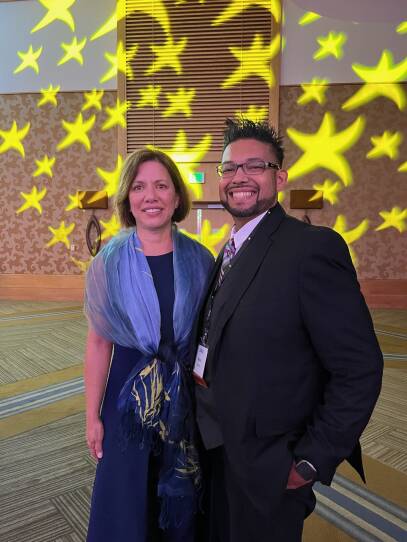When Marco Santana was 21, he lost his kidneys to strep throat, of all things. He spent more than a decade on dialysis while waiting for a new kidney. Santana, a Puerto Rican American, didn’t know much about transplants.
“I got a kidney transplant from a cadaver, and that, like I tell people, it kind of changed my whole world,” he said. Santana, now 48, called the biggest barrier one of “health literacy,” and said there was a lot of fear and misinformation in the Latino community about transplants.
Those are some of a number of hurdles organizations like the New England Donor Services are trying to raise awareness of during Hispanic Heritage Month, which runs through Oct. 15.
There are about 900 Latinos waiting for organ donation in New England, and around 600 of those are in Massachusetts. The majority of those are waiting for kidney donations. Hispanics are about twice as likely to develop serious kidney disease compared to white patients.
“Sometimes barriers and misconceptions that prevent for Latinos to become organ donors without knowing that also Latinos are much more in risk than Caucasian or other races to suffer from diabetes, renal failure, high blood pressure and heart disease,” said Ingrid Palacios, multicultural community outreach manager at New England Donor Services. She said those are the types of conditions that make Latinos more likely to need a transplant later in life than people of other races and ethnicities.
Another problem is getting Latino patients to the right doctor to diagnosis medical issues. “It’s access to healthcare, access for people to get those diagnoses,” she said.
The transplant system itself, she said, is equitable in who receives organs.
But federal data show that Hispanics are less likely to be donors.
Palacios is urging more people — including Hispanic people — to consider organ donation. Part of that process involves dispelling cultural and religious beliefs that get in the way. Many people, she said, believe their faith doesn’t support organ donation.
“One of the major religions in our culture, in the Latino culture, is Catholicism, where Pope Francis actually considered the act of donation as the ultimate act of love that someone can do for their neighbor,” she said.

Santana said he had a wonderful team of nurses who helped him throughout his healthcare journey, and he remembered that as he considered his future. He had dropped out of school and stopped working because he thought “end-stage renal disease was a death sentence.” After his first transplant, he went to nursing school.
“The transplant kind of gave me that that boost that I needed to go back to school, start work again and get my life in order — and actually do some living,” he said.
He graduated around the time of his second kidney transplant in 2020, and then became a nurse coordinating to help patients with anemia.
Santana said any transplant candidate should become educated and ask whatever questions they have — and not make assumptions.
“Get educated on what transplantation means and what your options are. Be ready for what comes with it, understanding all the medications and understanding the new lifestyle,” he said.
You can register as an organ donor at any time through the Registry of Motor Vehicles using your driver’s license or state ID. You can also inform your loved ones that you wish to donate organs in the event of your death.





